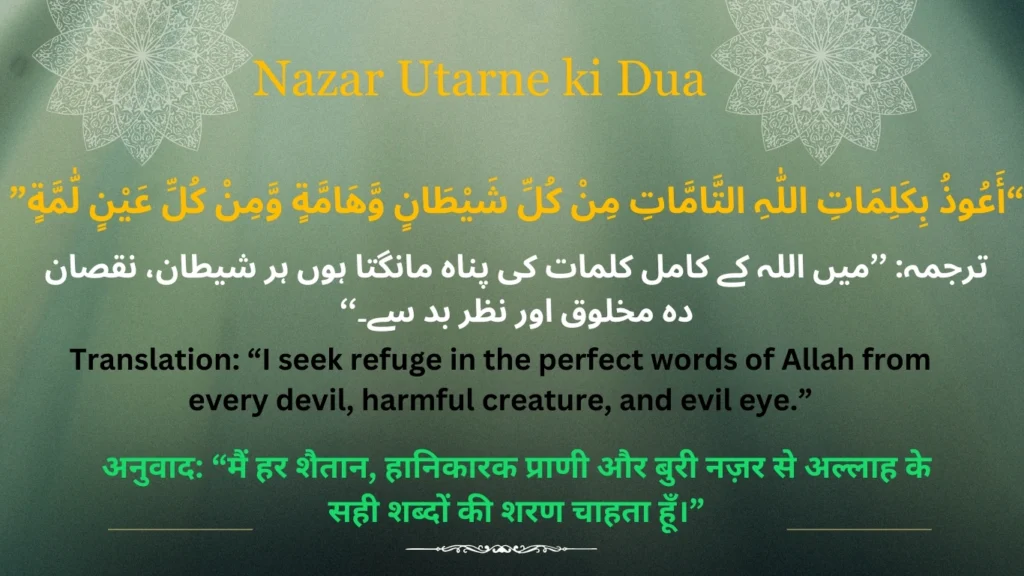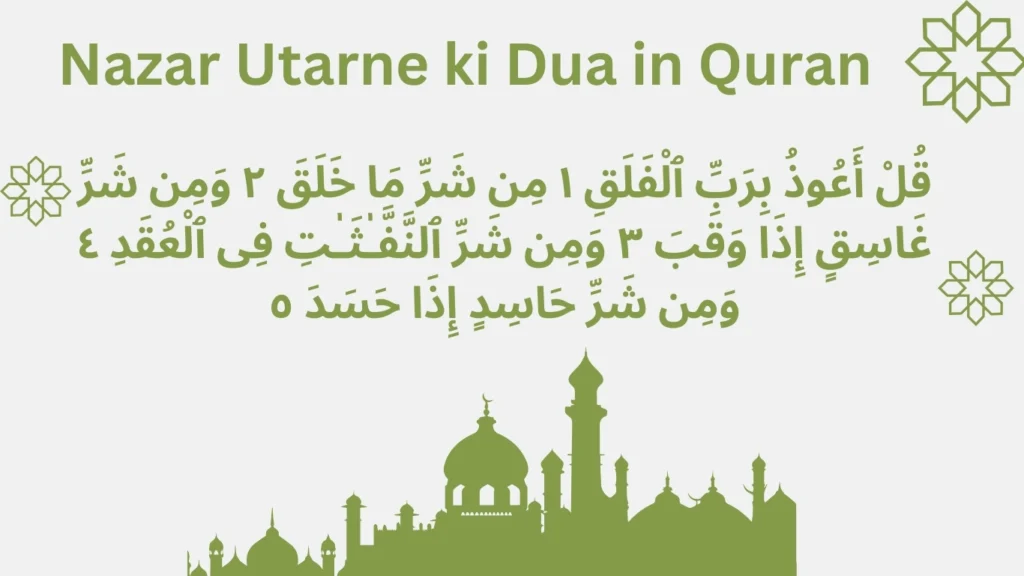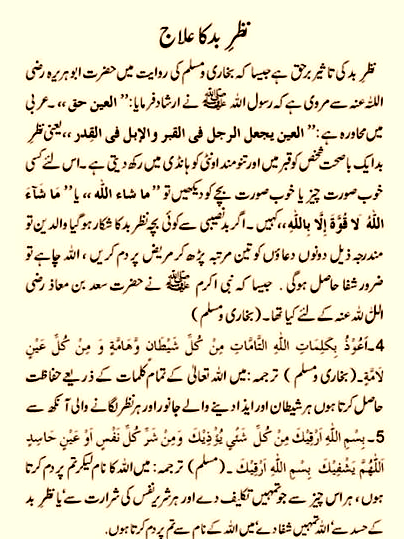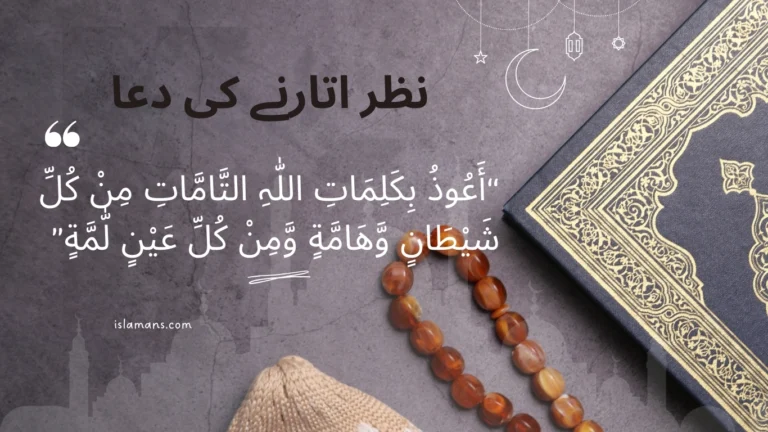In many cultures worldwide, the concept of the “evil eye” holds significant importance. This belief transcends various regions and religions, emphasizing the potential harm caused by someone’s envious glance. For those looking to protect themselves and their loved ones, understanding and utilizing the right “Nazar Utarne ki Dua” (prayer to ward off the evil eye) can be invaluable.
Nazar Utarne ki Dua in Urdu Hindi English

Nazar Utarne ki Dua In Quran

Nazar ki Dua For Baby

Nazar ki Dua by Prophet in Urdu

The evil eye is a deep-seated belief in many traditions. It is thought that an envious look or a malicious gaze can cause misfortune, illness, or other harm. This belief has been passed down through generations, with countless stories and anecdotes highlighting its effects.
One of the most common symptoms of the evil eye is sudden unexplained illness or a streak of bad luck. In many communities, people take various precautions to shield themselves from this malevolent force, including wearing amulets, using specific herbs, or reciting prayers.
Research suggests that the belief in the evil eye serves as a psychological mechanism to explain random misfortunes. However, for many, it is a tangible and potent threat that requires active measures to combat.
The Power of Dua
In Islamic culture, one of the most effective ways to protect oneself from the evil eye is through dua (supplication). Dua is a form of communication with Allah, asking for protection, blessings, and guidance.
Reciting specific duas can create a spiritual shield around an individual, guarding them against the harmful effects of envy and jealousy. These prayers are not just words but are believed to carry divine power and protection.
Muslims around the world rely on these supplications in their daily lives. From newborns to adults, everyone can benefit from the protective power of dua against the evil eye.
Common Duas for Protection
There are several duas that are commonly recited to ward off the evil eye. One of the most well-known is from Surah Al-Falaq (The Daybreak), which seeks refuge in Allah from the harm of envious individuals.
Another powerful dua is from Surah Al-Ikhlas (The Sincerity). This chapter emphasizes the oneness of Allah and His unmatched power, offering a potent shield against any malevolent forces.
Additionally, many people recite Ayat-ul-Kursi (The Throne Verse) from Surah Al-Baqarah. This verse highlights Allah’s supreme authority and protection over all creation, making it a formidable defense against the evil eye.
How to Perform Nazar Utarne
Nazar Utarne, or the act of removing the evil eye, involves specific rituals and practices. One common method is to recite the aforementioned duas while gently blowing over the affected person.
Another practice involves using salt or chilies. The belief is that these items can absorb the negative energy caused by the evil eye. After reciting the dua, these items are discarded or burned, symbolically removing the malefic influence.
It’s essential to approach these practices with faith and sincerity. The intention behind the actions plays a crucial role in their effectiveness.
Importance of Sincerity in Dua
When reciting dua, sincerity is paramount. It’s not merely about repeating words but genuinely seeking Allah’s protection and guidance. The heart’s intention and devotion can amplify the dua’s power.
Many scholars emphasize the importance of understanding the dua’s meaning. By comprehending the words and their significance, individuals can connect more deeply with their supplication.
Regular recitation and a strong connection with Allah can fortify one’s spiritual defenses, making them more resilient against the evil eye and other negative influences.
Community Practices and Beliefs
Different communities have unique practices and beliefs regarding the evil eye. In some cultures, new mothers and their babies are particularly vulnerable to the evil eye, necessitating additional protective measures.
In other regions, special gatherings or ceremonies are held to ward off the evil eye from individuals or households. These events often involve collective recitation of duas and other protective rituals.
Understanding and respecting these diverse practices can provide a broader perspective on the universal belief in the evil eye and the measures taken to counteract it.
Modern-Day Relevance
In today’s fast-paced world, the belief in the evil eye remains relevant. Despite advancements in science and technology, many still turn to traditional practices for protection against unseen forces.
The rise of social media has also amplified the potential for envy and jealousy. Sharing personal achievements and milestones can inadvertently attract the evil eye, making protective measures even more crucial.
Utilizing dua and other protective practices can offer peace of mind and a sense of security in an increasingly connected and visible world.
Personal Stories and Testimonials
Many individuals have shared their personal experiences with the evil eye and the protective power of dua. These testimonials highlight the significance of faith and the benefits of reciting specific supplications.
One mother recounted how her child fell ill repeatedly until she began reciting Ayat-ul-Kursi daily. She firmly believes that the dua played a pivotal role in her child’s recovery and ongoing health.
Another individual shared how wearing an amulet with inscribed duas provided a sense of security and reduced incidents of bad luck and misfortune.
Integrating Dua into Daily Life
Incorporating dua into daily routines can provide continuous protection against the evil eye. Simple practices, such as reciting dua before leaving the house or starting a new task, can create a protective barrier.
Parents are encouraged to teach their children these supplications from a young age. This practice not only offers protection but also instills a sense of faith and reliance on Allah.
Communities can also benefit from collective recitation of dua during gatherings, fostering a sense of unity and shared protection.
Educating Others
Raising awareness about the evil eye and the protective power of dua can benefit the broader community. Sharing knowledge and resources can empower others to take proactive measures for their spiritual well-being.
Workshops, seminars, and online platforms can serve as valuable tools for disseminating information about the evil eye and effective protective practices.
By educating others, individuals can contribute to a more informed and spiritually resilient community.
Conclusion
The belief in the evil eye is deeply rooted in various cultures and religions. While skeptics may view it as mere superstition, countless individuals swear by the protective power of dua and other traditional practices.
For those seeking to shield themselves and their loved ones from the harmful effects of envy and jealousy, understanding and utilizing the right “Nazar Utarne ki Dua” can be a game-changer. By incorporating these supplications into daily life and approaching them with sincerity, individuals can fortify their spiritual defenses and enjoy greater peace of mind.

